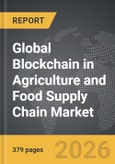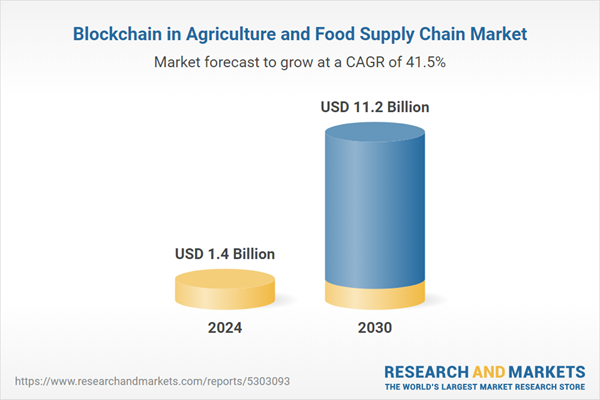Global Blockchain in Agriculture and Food Supply Chain Market - Key Trends & Drivers Summarized
How is Blockchain Transforming the Agriculture Industry?
Blockchain technology is revolutionizing the agriculture and food supply chain industry by creating a transparent, decentralized, and traceable system for managing agricultural processes and food distribution. Traditionally, the agricultural sector has been plagued by inefficiencies in record-keeping, fraud, and supply chain disruptions, which have led to substantial losses for farmers, retailers, and consumers. Blockchain technology addresses these pain points by offering immutable, verifiable data records that enhance transparency from the farm to the consumer. The technology allows each participant in the supply chain, including producers, distributors, retailers, and consumers, to trace the origin, production conditions, and journey of agricultural products. This increased transparency has the potential to significantly reduce fraud, boost food safety, and promote sustainable practices within the industry. The use of blockchain is not just about digitizing processes but also about redefining trust across the agricultural ecosystem by mitigating risks associated with counterfeit goods and quality issues.Blockchain's implementation in agriculture extends to land registration, agricultural insurance, and payments. For instance, smart contracts allow for faster and more secure payments, benefiting smallholder farmers who traditionally face long delays in receiving payment for their produce. These contracts automatically execute when conditions specified in the blockchain are met, thus eliminating middlemen and ensuring fair transactions. In a world increasingly focused on sustainability, blockchain also provides the tools to track environmental impact metrics, such as carbon footprint or water usage, helping to promote responsible agricultural practices. This ability to provide clear, verifiable data on sustainability metrics makes blockchain an attractive option for the agricultural industry, especially as consumers demand more eco-conscious products.
What Role Does Blockchain Play in Ensuring Food Safety and Traceability?
Blockchain's most prominent role in the agriculture and food supply chain is enhancing food safety by offering an unbroken chain of data from farm to fork. One of the most significant challenges facing the food industry is ensuring that products are safe, properly labeled, and free from contamination. The current system, relying on centralized databases and paper-based records, is prone to human error and intentional tampering, both of which can result in health crises, recalls, and brand damage. Blockchain mitigates these risks by enabling real-time monitoring and instant traceability of food items as they move through the supply chain. Each step in the process - from planting and harvesting to processing, packaging, and distribution - is recorded on the blockchain, and this data is immutable, making it virtually impossible to alter without detection.This real-time visibility has profound implications for improving food recall systems, which are often slow and inefficient. When a contamination or safety issue is identified, blockchain allows companies to pinpoint the affected batch quickly, limiting the scope of recalls and minimizing waste. Companies like IBM and Walmart are already implementing blockchain-based systems to ensure food traceability and safety, allowing them to trace contaminated products back to their source in seconds rather than days. Blockchain's applications extend to verifying the authenticity of organic or non-GMO products, ensuring that consumers are receiving products that align with their values. As food safety regulations become more stringent worldwide, blockchain is proving to be an essential tool for ensuring compliance with global standards and reducing the risk of costly penalties or loss of consumer trust.
Can Blockchain Technology Facilitate Fair Trade and Empower Farmers?
Blockchain has emerged as a critical tool for promoting fair trade and empowering smallholder farmers by facilitating more equitable distribution of profits within the agricultural value chain. In many developing regions, farmers struggle with exploitative pricing models, where middlemen take a significant cut of the profits, leaving the producers with minimal returns. Blockchain technology allows for direct interactions between producers and buyers, ensuring that farmers receive fair compensation for their work. By eliminating intermediaries, blockchain simplifies the supply chain and creates opportunities for small-scale farmers to access larger markets, sell their produce at competitive rates, and ensure they are paid promptly. The use of digital tokens and cryptocurrencies on blockchain platforms is also expanding, providing farmers in remote areas access to global markets without requiring traditional banking infrastructure.Moreover, blockchain can help verify certifications like Fair Trade, Organic, and Rainforest Alliance, offering farmers a platform to authenticate their sustainable practices. As consumers increasingly seek out ethically sourced products, blockchain ensures that buyers can trust the claims made about a product's origins, from fair labor practices to sustainable farming methods. For cooperatives and farming collectives, blockchain serves as a tool to enhance collaboration, improve decision-making, and increase operational efficiency. It also aids in accessing financial services, such as loans and crop insurance, by providing a verifiable credit history through blockchain records. This access to capital, previously limited due to lack of formal credit ratings, empowers farmers to invest in productivity-enhancing technologies and sustainable practices.
What Factors Are Driving the Growth of Blockchain in Agriculture and Food Supply Chain?
The growth in the blockchain in agriculture and food supply chain market is driven by several factors, including the increasing demand for food transparency and traceability, consumer interest in sustainability, and the need for better supply chain efficiency. As food safety concerns rise globally, businesses are increasingly investing in blockchain solutions to ensure that their supply chains are secure and transparent. The rapid adoption of blockchain is also fueled by regulatory demands for better food traceability, especially in markets like the European Union and the United States, where food safety standards are stringent. Another driving factor is the growing consumer preference for ethically sourced and sustainable products. Consumers today want to know the origin of their food, the conditions under which it was produced, and the environmental impact of their purchases. Blockchain provides the infrastructure for verifying these claims, helping brands meet evolving consumer expectations.Technological advancements such as the integration of blockchain with the Internet of Things (IoT) and artificial intelligence (AI) are also spurring market growth. IoT sensors in farming equipment can provide real-time data on crop conditions, which, when recorded on a blockchain, offers accurate and immutable records of agricultural inputs and outputs. This seamless integration enhances decision-making and operational efficiency. Furthermore, the rising interest in digital payments and cryptocurrencies in the agriculture sector is driving blockchain adoption. Blockchain facilitates faster, secure, and cost-effective cross-border transactions, making it an attractive option for global agricultural trade. The market's expansion is further supported by government initiatives and public-private partnerships aimed at enhancing food security and reducing food waste through advanced technological solutions. Overall, the convergence of technological innovation, consumer demands, and regulatory frameworks is propelling the blockchain in the agriculture and food supply chain market forward.
Report Scope
The report analyzes the Blockchain in Agriculture and Food Supply Chain market, presented in terms of market value (US$ Thousand). The analysis covers the key segments and geographic regions outlined below.- Segments: Organization Size (Large Enterprises, SMEs); Application (Product Traceability, Tracking & Visibility, Payment & Settlement, Smart Contract, Governance, Risk & Compliance Management).
- Geographic Regions/Countries:World; United States; Canada; Japan; China; Europe (France; Germany; Italy; United Kingdom; and Rest of Europe); Asia-Pacific; Rest of World.
Key Insights:
- Market Growth: Understand the significant growth trajectory of the Large Enterprises segment, which is expected to reach US$6.6 Billion by 2030 with a CAGR of a 40.9%. The SMEs segment is also set to grow at 42.5% CAGR over the analysis period.
- Regional Analysis: Gain insights into the U.S. market, valued at $431.2 Million in 2024, and China, forecasted to grow at an impressive 38.4% CAGR to reach $1.5 Billion by 2030. Discover growth trends in other key regions, including Japan, Canada, Germany, and the Asia-Pacific.
Why You Should Buy This Report:
- Detailed Market Analysis: Access a thorough analysis of the Global Blockchain in Agriculture and Food Supply Chain Market, covering all major geographic regions and market segments.
- Competitive Insights: Get an overview of the competitive landscape, including the market presence of major players across different geographies.
- Future Trends and Drivers: Understand the key trends and drivers shaping the future of the Global Blockchain in Agriculture and Food Supply Chain Market.
- Actionable Insights: Benefit from actionable insights that can help you identify new revenue opportunities and make strategic business decisions.
Key Questions Answered:
- How is the Global Blockchain in Agriculture and Food Supply Chain Market expected to evolve by 2030?
- What are the main drivers and restraints affecting the market?
- Which market segments will grow the most over the forecast period?
- How will market shares for different regions and segments change by 2030?
- Who are the leading players in the market, and what are their prospects?
Report Features:
- Comprehensive Market Data: Independent analysis of annual sales and market forecasts in US$ Million from 2024 to 2030.
- In-Depth Regional Analysis: Detailed insights into key markets, including the U.S., China, Japan, Canada, Europe, Asia-Pacific, Latin America, Middle East, and Africa.
- Company Profiles: Coverage of players such as Agridigital, Ambrosus, Arc-Net, Blockgrain, Chainvine and more.
- Complimentary Updates: Receive free report updates for one year to keep you informed of the latest market developments.
Some of the 279 companies featured in this Blockchain in Agriculture and Food Supply Chain market report include:
- Agridigital
- Ambrosus
- Arc-Net
- Blockgrain
- Chainvine
- IBM
- Microsoft
- Origintrail
- Provenance
- Ripe.Io
This edition integrates the latest global trade and economic shifts into comprehensive market analysis. Key updates include:
- Tariff and Trade Impact: Insights into global tariff negotiations across 180+ countries, with analysis of supply chain turbulence, sourcing disruptions, and geographic realignment. Special focus on 2025 as a pivotal year for trade tensions, including updated perspectives on the Trump-era tariffs.
- Adjusted Forecasts and Analytics: Revised global and regional market forecasts through 2030, incorporating tariff effects, economic uncertainty, and structural changes in globalization. Includes historical analysis from 2015 to 2023.
- Strategic Market Dynamics: Evaluation of revised market prospects, regional outlooks, and key economic indicators such as population and urbanization trends.
- Innovation & Technology Trends: Latest developments in product and process innovation, emerging technologies, and key industry drivers shaping the competitive landscape.
- Competitive Intelligence: Updated global market share estimates for 2025, competitive positioning of major players (Strong/Active/Niche/Trivial), and refined focus on leading global brands and core players.
- Expert Insight & Commentary: Strategic analysis from economists, trade experts, and domain specialists to contextualize market shifts and identify emerging opportunities.
Table of Contents
Companies Mentioned (Partial List)
A selection of companies mentioned in this report includes, but is not limited to:
- Agridigital
- Ambrosus
- Arc-Net
- Blockgrain
- Chainvine
- IBM
- Microsoft
- Origintrail
- Provenance
- Ripe.Io
Table Information
| Report Attribute | Details |
|---|---|
| No. of Pages | 379 |
| Published | February 2026 |
| Forecast Period | 2024 - 2030 |
| Estimated Market Value ( USD | $ 1.4 Billion |
| Forecasted Market Value ( USD | $ 11.2 Billion |
| Compound Annual Growth Rate | 41.5% |
| Regions Covered | Global |









